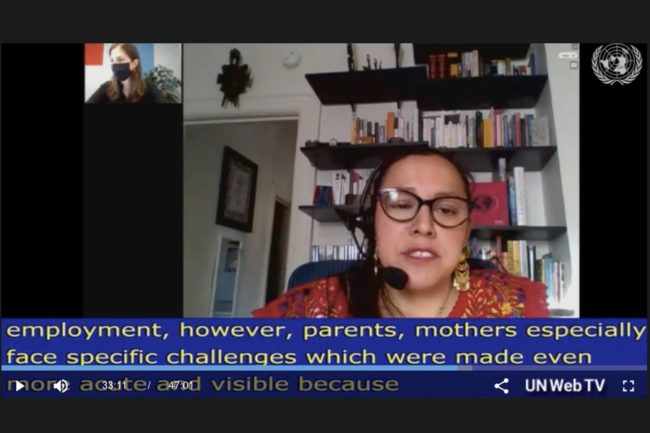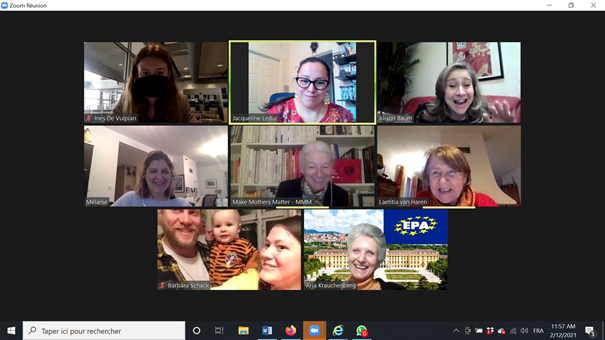MMM spotlights parenting and motherhood challenges in the digital era
19.02.21
UN New York, CSocD59 – MMM's oral statement at the general debate closed our series of contributions to the 59th UN Commission on Social Development

Digital technology has already transformed societies and economies in many parts of the world, introducing novel ways to communicate, changing lifestyles and creating new types of employment.
However, parents, mothers especially, face specific challenges, which were made even more acute and visible due to the Covid-19 crisis and its subsequent lockdowns:
- Remote schooling: mothers are usually the ones “in-charge” in families – much more than fathers, and this responsibility collides with their own work obligations. Many also lack digital literacy to support their children in accessing online courses. And of course, many families must face the simple fact that the lack of adequate computer or internet access makes remote learning an illusion for their child who risks being left behind.
- Teleworking: for those who are able or obliged to telework, childcare obligations might make it impossible for mothers to attain a reasonable work-life balance. The right to disconnect has also become an issue, and many mothers, much more than men or women without children, have lost their jobs during the pandemic.
- Managing children’s screen time, protecting them and controlling internet content: many parents feel powerless when it comes to setting the right balance in ICT use for their children, finding suitable content, and preventing online violence or access to inappropriate content.
In families with children, mothers, much more than fathers, have seen the time they devote to childcare and unpaid family care work increase during the lockdowns. They have been struggling to balance telework and support for online schooling, with major impacts on their health and their ability to keep their job – a situation that also threatens to reverse years of hard-won progress on Gender Equality.
All These challenges must be recognized and addressed, by both governments and the private sector.
In particular, all forms of care and education work, whether paid or unpaid, must be recognised and properly valued. They must also be seen as an investment in human capital, not as expenses to be minimised.
The current crisis gives us the opportunity to bring about systemic changes. We are therefore calling on member states to ‘build back transformatively’ and repurpose our economic system to prioritize the wellbeing of people, and place care and education at its heart.
This statement was delivered by Jacqueline Leduc, MMM’s main representative at the United Nations in New York during the general debate which took place on 16 February on the priority theme of the 59th Session of the UN Commission on Social Development ‘Socially just transition towards sustainable development: the role of digital technologies on social development and well-being of all’. (MMM intervention starts at 3230)
Summary of MMM contributions to the 2021 Commission
This oral statement concludes our series of advocacy activities to raise awareness of the many potential benefits of digital technologies for the wellbeing of families, but also the multiple challenges that parents, especially mothers face in this new digital era brought about by the pandemic:
- Written Statement: Digital technologies for mothers – opportunities and challenges
- Side-event of 12 February on Harnessing digital technologies for the wellbeing of families
- Communication featuring a video montage with mothers talking about the benefits and challenges brought about by the invasion of digital technologies in their lives
- Spotlight on our associate member, Leila Cherif of l’Heure Joyeuse, Morocco, whose video testimony, compiled from our MMM Voices Covid-19 interview with her, was shown as part of a montage which opened an event of the Forum organized by the NGO Committee on Social Development as part of the Commission
- Contribution and support to the Civil Society declaration 2021 presented by the NGO Committee on Social Development to the Commission
The resolution that was adopted at the end of the Commission on the priority theme acknowledges that digital technologies have profoundly transformed global societies. It also recognizes the digital divide within and among countries, urban/rural and between generations and genders. It fails however to recognize the multiple challenges that parents face with the use of digital technologies within families.

MMM Team (Inès de Vulpian, Jacqueline Leduc, Mélanie Nédélec, and Valerie Bichelmeier) exchanging with panelists after our 12 February webinar
The New EU Gender Equality Roadmap : A Call for Inclusion of Mothers
04.03.25
The European Commission’s initiative on a new Gender Equality Roadmap post-2025, marks a significant step forward in addressing gender disparities across the European Union. Make Mothers Matter (MMM
Breaking the Cycle: Gender Equality as a Path to Better Mental Health
18.03.25
The Council of the European Union has taken a decisive step in recognising the vital connection between gender equality and mental health.
Europe Must Listen to Mothers: Our landmark report heads to the European Parliament
28.08.25
On 22 September 2025, the voices of mothers will take centre stage in Brussels. For the first time, Make Mothers Matter (MMM) will present its State of Motherhood in Europe








